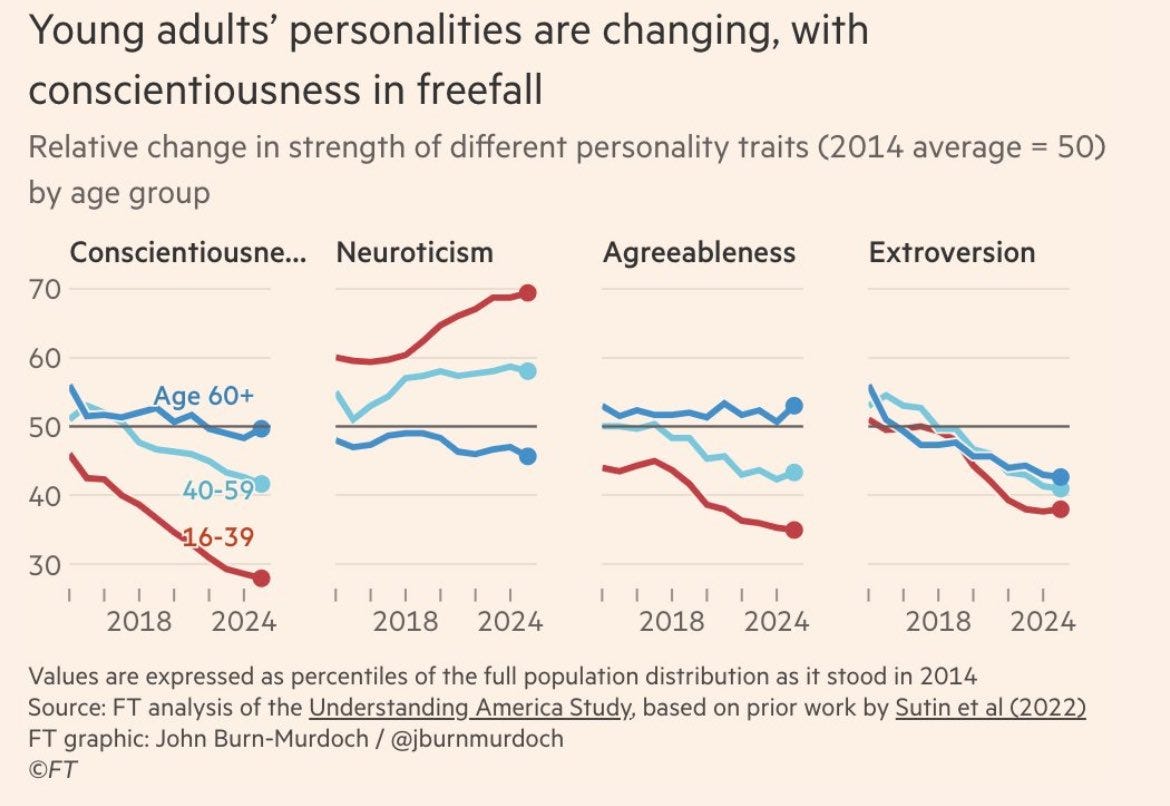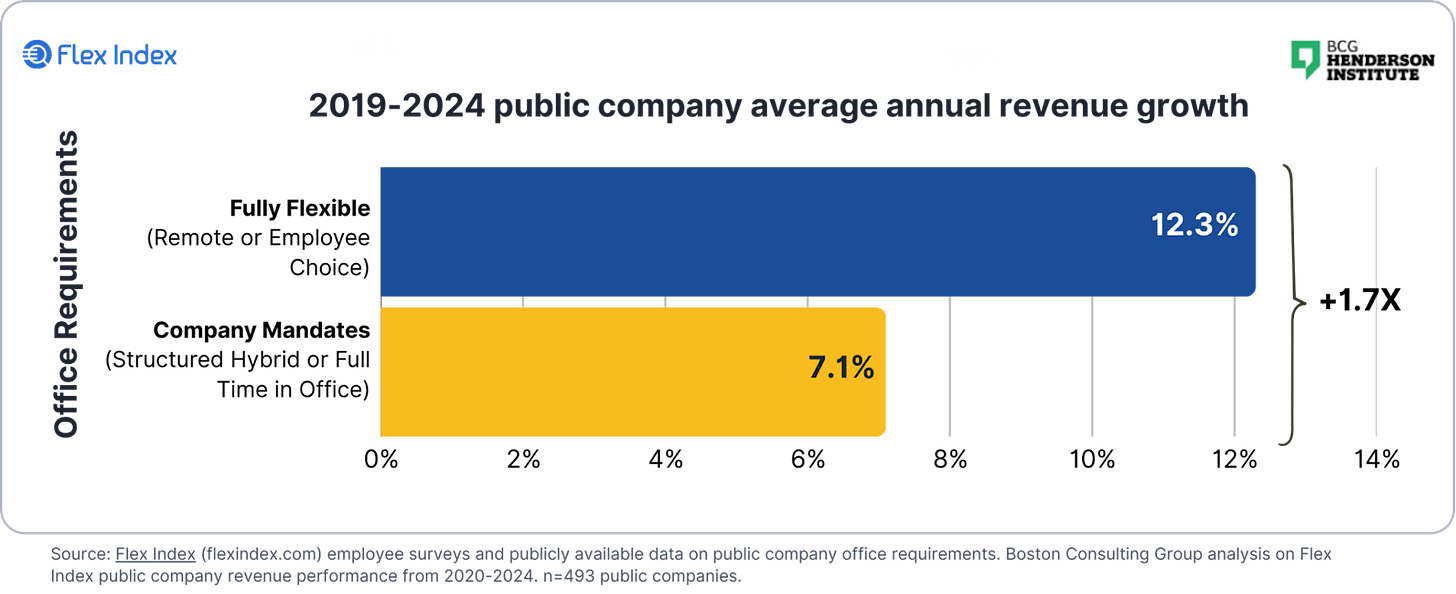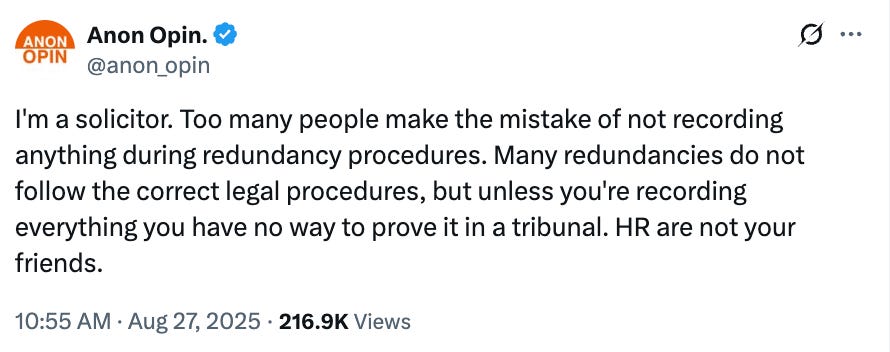The summer season’s over, child. Look out the window. Summer season’s gone. I do know you weren’t actually listening to work chat whereas the climate was good, so let’s recap on what you missed.
Final month the FInancial Occasions printed an article by John Burn Murdoch within the type of an evaluation of persona information, particularly what are styled the Large 5 persona traits: openness, conscientiousness, extraversion, agreeableness, and neuroticism.
The paper pulled no punches with the headline, observing that conscientious was ‘in freefall’. I needed to go deeper with this perception as a result of it has the potential to remodel how we construct office cultures.

The analysis is fascinating as a result of it surveys a constant panel of 7000 adults annually. The drops within the traits described are in the identical folks over time: we’re changing into much less extroverted, much less conscientious and fewer agreeable.
Usually these 5 components are considered a statistically dependable approach to measure persona. In contrast to methodologies like Myers Briggs these components show constant over time and psychologists take a view that a lot of the variance of human persona might be understood utilizing these components. Apparently these traits additionally show predictive for different outcomes. Conscientiousness for instance predicts educational success and job efficiency, neuroticism can predict psychological well being points.
This issues within the context of labor as a result of teamwork is solely predicated on the thought of us being agreeable and conscientious and to some extent leaning into no matter extroversion we really feel. If teamwork has been upended then it has implications for a way we construct cultures. When you’ve got a tradition that’s primarily based on attentive service and constructing reference to prospects then it’s potential that these issues not come as commonplace.
If these traits are actually in freefall it is going to be massively consequential for work – each how we carry out it and the way we staff with colleagues.
The overwhelming majority of the protection of Burn Murdoch’s evaluation was constructive, however there have been a few important posts that individuals dropped within the feedback after I first shared it. The gist of the criticism was that the impact dimension of the modifications was far smaller than the graph recommended.
‘The youngest age group, 39 and youthful, which was the main target of all of the fuss, reveals imply conscientiousness rating of 35.51 out of a variety of 9-45 of their 2015–2017 information, the primary information level accessible. That is truly fairly excessive. By the most recent information level, 2023–current, it had dropped to 33.26…truly nonetheless fairly excessive. That is a drop of a mere 2.28 factors.’
Psychologist Jay Van Bavel challenges this pushback suggesting that whereas that change may appear numerically small, it’s substantial:
‘The Flynn impact is maybe essentially the most well-known persona change. IQ grew a full commonplace deviation (14 factors) in 66 years. But the change in conscientiousness is going on even quicker. The weblog [challenging the effect size] notes that it dropped .4 SD in a mere 7-8 years. The creator claims this can be a very small impact. But, If this pattern continues, it would simply be bigger than the Flynn effect–it’s altering 3 to 4 occasions quicker than IQ did. We have to put impact sizes in a broader context to know them. These persona modifications are literally very sizable by historic requirements.’
I particularly loved the contribution of Professor Alex Haslam. Haslam seemed on the questions within the Large 5 survey that generate the conscientiousness rating:
-
“I work onerous to perform my objectives”
-
“I’m reliable and might be relied upon”
-
“I’m keen to place within the effort to finish a process, even when it is tough”
-
“I’m ready to withstand temptations that will derail my progress”
-
“I imagine that guidelines must be adopted at any time when potential”
His conclusion was that it was as seemingly that the modifications mirrored ‘widespread disenchantment with things like rampant managerialism’. Work has simply turn out to be so uninteresting and bureaucratic that we battle to be conscientious.
General I err on the aspect of feeling that John Burn Murdoch has revealed one thing that’s of big significance, and may have a significant influence on how we construct groups.

I took this dialog to the podcast, speaking to Nick McClelland, the CEO of Byrne Dean, an company that specialises in coping with cultural points inside organisations. One particular person describes Byrne Dean because the ‘greatest stored secret within the Metropolis’.
We discuss in regards to the analysis and what it means for work.
Pay attention: web site / Apple / Spotify

-
One other signal that consultancy companies are standing on a cliff edge: a $400k Deloitte report for the Australian authorities was caught having unchecked AI content material – together with half a dozen references that didn’t exist, and an invented quote of a court docket judgment
-
I favored this, in a round-up on Manchester United’s defeat to Grimsby City, veteran sport journalist Henry Winter observes that ‘team-first, individual-second’ cultures have gotten much less widespread. As Winter says, ‘What’s occurring at United will not be a narrative of dangerous gamers however dangerous tradition and poor management’
-
‘Does forcing folks into the workplace actually enhance an organization’s tradition?’ asks The Economist, writing in regards to the influence of hybrid engaged on office mojo. It reviews a research that discovered that ‘companies which insisted on staff returning to the workplace after the pandemic noticed job satisfaction fall and employees turnover rise’. The piece delves into information plundered from Glassdoor critiques discovering that employers that ordered a full RTO have been rated by workers as having extra agility, however have been seen as being much less supportive, and extra poisonous. Management was additionally perceived as being worse. (Some good feedback on LinkedIn to this)
-
On related traces, Flex Index printed outcomes of some BCG analysis into the efficiency of US organisations after which matched it to their working insurance policies. Organisations that have been extra versatile tended to develop quicker than companies who have been totally onsite:

-
Plenty of feedback on the final publication publish about AI coaches. One particularly brutal one got here from Lee: ‘For me BetterUp’s app is simply what work gives to employees once they’re feeling down about not being developed. Supervisor not exhibiting any curiosity in you? We’ve acquired you a BetterUp subscription. It’s the brand new Headspace sub, now get again to your 996.’
-
Is your boss a dickhead? It’s not a sackable offence to let him know in response to a UK employment tribunal
-
An MIT report discovered that 95% of firm AI pilots have been failing to provide any advantages. The report means that day-after-day use of ChatGPT advantages from its flexibility, however office implementations stall as a result of ‘they don’t be taught from or adapt to workflows’

-
Whereas I’m posting that nameless publish I’ll give one other toot on this publish about Topic Entry Requests (that are regulation within the UK and the EU). Greater than a handful of individuals have contacted me saying this publish acquired them a a lot improved settlement when their work was efficiency managing them out of the enterprise
Elevate your perspective with NextTech Information, the place innovation meets perception.
Uncover the most recent breakthroughs, get unique updates, and join with a worldwide community of future-focused thinkers.
Unlock tomorrow’s traits at this time: learn extra, subscribe to our publication, and turn out to be a part of the NextTech neighborhood at NextTech-news.com

